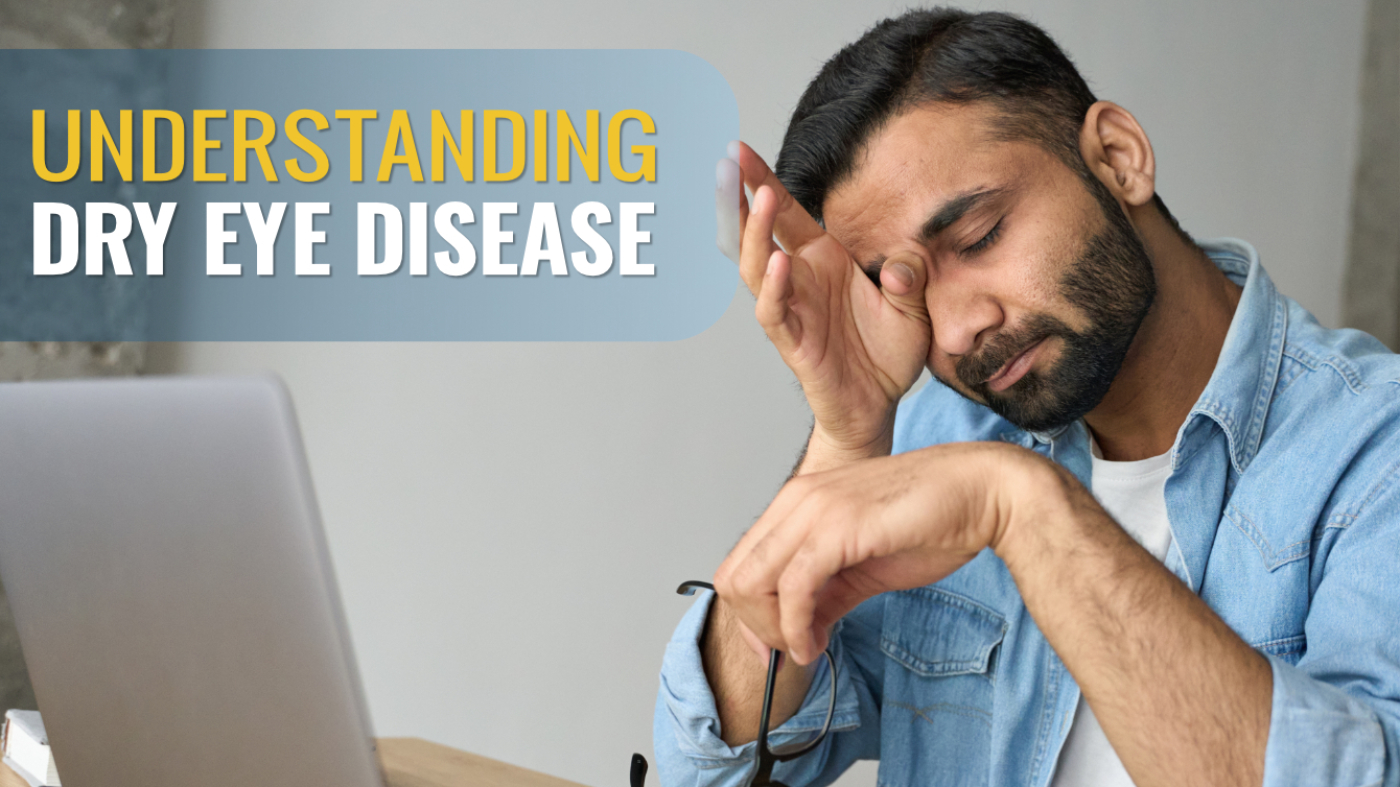Dry Eye Disease
Having dry eyes can be a painful and often irritating chronic condition. However, there are a variety of treatments available to treat dry eye disease. Dry eye disease is a condition marked by discomfort, irritation, itchiness, and if serious enough, pain in the eyes. It can be caused by your body not providing enough tears, or not producing tears of sufficient quality to properly lubricate and protect your eyes. Aside from providing lubrication, your tears also protect your eyes from infection, rinse away foreign matter, and keep the surface of your eye, or cornea, clear and smooth. If left untreated, dry eye disease can cause damage to your cornea and lead to vision loss.
Why Are My Eyes Dry?
Your eyes may be dry due to a lack of production of tears, or if your tears don’t have the proper levels of three necessary elements. Tears are comprised of three ingredients: water, oil, and mucus. The oil in your tears prevents the water from evaporating, and the mucus acts to spread the tears evenly over the surface of your eye. When your tears don’t provide the necessary lubrication to protect them, you can develop the symptoms of dry eye disease.
What Causes Dry Eyes?
There are many reasons why you may be experiencing dry eyes. Age is the number one reason for dry eye disease, and most people over the age of 65 experience dry eyes to some degree. Older women are even more likely to experience symptoms since menopause can also cause it. Women under the age of 65 are also more likely than men to experience dry eye disease due hormonal changes caused by pregnancy and birth control medications.
Certain medical conditions and medications can also contribute to dry eye disease. Diabetes, rheumatoid arthritis, thyroid issues, or existing eye problems, including refractive eye surgery (LASIK), can all put you at additional risk of suffering from dry eyes. Additionally, blood pressure medications, anti-depressants, antihistamines, and decongestants can cause dry eye.
Environmental conditions like dry air, wind, and smoke can cause your eyes to dry out. Not blinking often enough can also contribute to dry eyes.
How Do You Know if You Have Dry Eye Disease?
Dry eye disease can be easily identified with a comprehensive eye exam and a look at your medical history. During your eye exam, our ophthalmologists and optometrists will pay close attention to how much tear fluid you’re producing and the quality of your tears. They will also monitor your blinking rate for signs of infrequency.
What are the Treatment Options for Dry Eyes?
Treatment for dry eye disease comes down to two main things: Increasing the amount of tears you produce and conserving the ones you make.
Increasing the quality of tears can be done in several ways. The simplest solution for mild cases of dry eye disease are over-the-counter artificial tears which can be found readily at any pharmacy and most supermarkets. We recommend only using artificial tears that do not contain any preservatives, as they can further irritate your eyes. If supplemental tears aren’t working for you, other prescription-only eye drops can be prescribed, which will increase your body’s natural production of tears. Some studies suggest that omega-3 fatty acids may naturally help your body produce more effective tears naturally.
Conserving your tears, or making sure they’re not draining from your eyes too quickly, can be achieved through the use of tiny tear duct plugs which are inserted into your tear ducts that serve as drains. In healthy eyes, these drains are used to regulate the amount of tears in your eyes by draining excess fluid into a cavity leading to the back of your nose. If you’re not producing enough tears, plugging these ducts will allow your eyes to retain the tears for longer.
If your dry eyes are being caused by another ailment, your doctor can directly treat that condition which should clear up your dry eye disease.
Preventing Dry Eye Disease
In some cases, dry eye disease can be prevented. Always remember to blink often when using devices with screens, like computers, TVs, pads, etc. As noted earlier, an omega-3 nutritional supplement may increase your quality tear production, but always speak with your physician before beginning any new dietary regimen. Wearing wrap-around sunglasses can help to prevent dry eye by blocking the wind and sun. Speaking of sun, avoid areas that are known to be dry, such as deserts and high altitude locations. Using a humidifier in your home can also reduce dry eyes. And, of course, don’t forget to stay properly hydrated.
Speak with an Ophthalmologist or Optometrist
If you or a loved one are experiencing symptoms of dry eye disease, our highly trained specialists are waiting to assist.
Call one of our eight convenient locations, 844-485-3202 or click here to make an appointment online.

